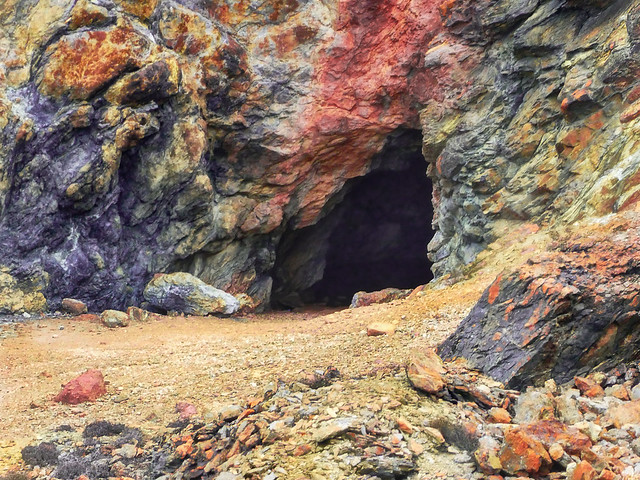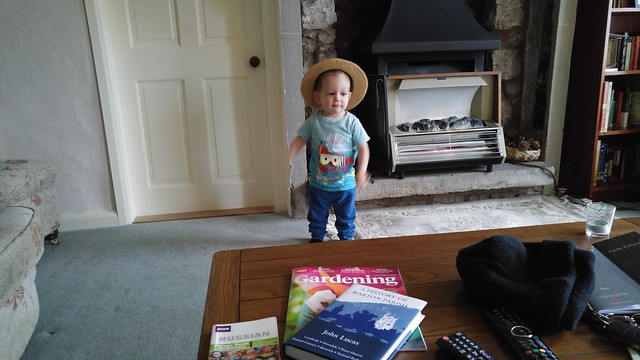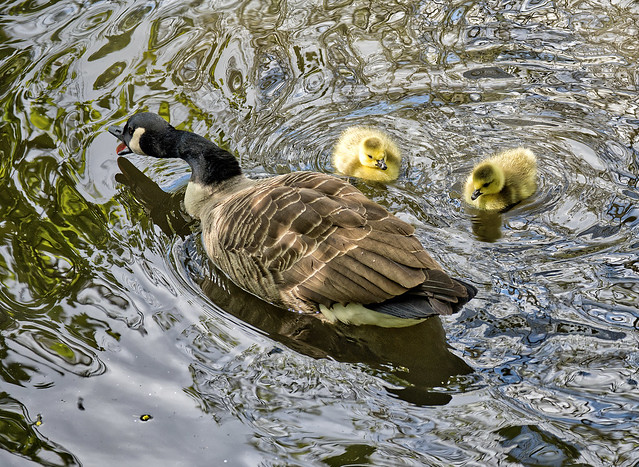Today we’re looking at the words for door, gate, port, harbour and related things in Celtic languages.

Words marked with a * are reconstructions.
| Proto-Celtic |
*dwār = door |
| Gaulish |
*durom = door – was borrowed into Latin and appeared in placenames such as Augustodurum (now Bayeux), and Nemetodurum (now Nanterre) |
| Proto-Brythonic |
*dor = door |
| Old Welsh |
dor = door |
| Middle Welsh (Kymraec) |
dor = door |
| Welsh (Cymraeg) |
dôr [druːs] = door; defence, refuge, shield; opportunity; protector, defender, chief, leader
dôr blyg(edig) = folding door
dôr ddyrchafad = portcullis |
| Middle Breton |
dor = door |
| Breton (Brezhoneg) |
dor [doːr] = door
dor-dal = front door, portal
dorlec’h = door frame
dor a-dreñv = rear door
dor a-raok = front door
dor emgefre = automatic door
dor greñvaet = fortified gate
dor harz tan = fire door
dor-borzh = gate (of a courtyard)
dor brenestr = French window
gwir treuz-dor = doorstep |
Etymology from the Proto-Indo-European *dʰwṓr (door), from *dʰwer- (doorway, door, gate) [source].
Words from the sane Proto-Indo-European root include: door and forum in English, deur (door) in Dutch, Tür (door, doorway) in German, dehors (outside) in French, fuori (outside) in Italian, and fuera (outside) in Spanish [source].
| Proto-Celtic |
*dworestus = door |
| Old Irish (Goídelc) |
dorus [ˈdorus] = door |
| Middle Irish (Gaoidhealg) |
dorus [ˈdorus] = door |
| Irish (Gaeilge) |
doras [ˈd̪ˠɔɾˠəsˠ] = door, doorway
doras isteach = entrance
doras amach = exit
doras tosaigh / béil = front door
doras cúil / thiar = backdoor
doirseach = having doors, open, accessible, gaping (wound)
doirseoir = door-keeper, (hall) porter
doirseoireacht = occupation of door-keeper |
| Scottish Gaelic (Gàidhlig) |
dorus [dɔrəs] = door, valve
dorus-beag = back door, inner door
dorus-mór = front door, main entrance
doras a-mach = exit
àrd-doras = lintel
ath-dhoras = next door
deoch an dorais = stirrup cup, one for the door/road, Jock and Doris |
| Manx (Gaelg) |
dorrys = door, doorway, gate, portal; back (of cart), fly (of tent)
dorrys doont = back door
dorrys toshee = front door
dorrys egin = emergency exit, exit
jough yn dorrys = parting drink, stirrup cup
sole y dorrys = doorstep, threshold |
| Proto-Brythonic |
*drus = doorway, entrance, door |
| Old Welsh |
drus = doorway, entrance, door |
| Middle Welsh (Kymraec) |
drus, drvs, drws = doorway, entrance, door |
| Welsh (Cymraeg) |
drws [druːs] = doorway, entrance, door, pass, estuary, opening, opportunity, facility
drws codi/cudd = trap-door
drws nesaf = next door (to), very near (to), bordering (on)
wrth y drws = at hand, close, near
o ddrws = from before
drysaf, drwsaf, dryo, drwso = to mind a door (in a coal-mine)
dryswr, drwswr = door-boy (in a coal-mine)
drysor = doorkeepr, janitor, porter |
| Middle Cornish |
daras, darat = door
darador = doorkeeper |
| Cornish (Kernewek) |
daras = door
darasik = wicket
penn/pedn daras = lintel |
Etymology from the Proto-Celtic *dwār (door) – see above [source].
| Old Irish (Goídelc) |
port [por͈t] = place, shore, bank |
| Middle Irish (Gaoidhealg) |
port = place, spot, locality, stead, abode, settlement, bank, shore, mound, entrenchment |
| Irish (Gaeilge) |
port [ˈd̪ˠɔɾˠəsˠ] = landing-place, harbour, port, bank, place of refuge, haven, resort, fortified place, stronghold
aerfort = airport
calafort = port, harbour |
| Scottish Gaelic (Gàidhlig) |
port [pɔr̪ˠʃd] = port, dock
port-adhair = airport
baile-puirt = seaside village, port town
long-phort = seaport |
| Manx (Gaelg) |
purt = harbour, port, station
purt aer = airport
purt awiney = river port
purt lhuingey, lhong-phurt = seaport |
| Middle Welsh (Kymraec) |
porth = port, harbour, haven
porthua, porthfa = harbour, port, coast, haven, refuge |
| Welsh (Cymraeg) |
porth [pɔrθ] = port, harbour, haven, estuary, landing-place, ferry
porthfa = harbour, port, coast, haven, refuge
porthfad = ferryboat, wherry
porthladd = harbour, port, coast, safe anchorage
porthwas = ferryman, boatman, porter, carrier |
| Middle Cornish |
porth = (sea) port, harbour, bay |
| Cornish (Kernewek) |
porth = cove, harbour, haven, port
porth klos = docks
porthva = wharf |
| Middle Breton |
porz = port
porz mor, portz mor = seaport |
| Breton (Brezhoneg) |
porzh [pors] = port
porzh-mor [pɔrzˈmoːr] = seaport |
Etymology from Latin portus (harbour, port, haven, refuge, warehouse), from Proto-Italic *portus (harbour) the Proto-Indo-European *pértus (crossing, from *per- (to lead, cross over, pass) [source].
Words from the same roots include port, portal, porter and portico in English, porte (door, gate, means) in French, puerta (door, gate, goal) in Spanish, póirse (porch, lobby, passage, closet) in Irish, and furta (wicket gate, port) in Polish [source].
| Proto-Brythonic |
*porθ = door, gate, gateway
*porθọr = porter, gatekeeper |
| Middle Welsh (Kymraec) |
porth, pyrth, pirth = portal, door, gate(way)
porthavr, porthaur, porthawr, porthor = porter, gatekeeper, doorkeeper |
| Welsh (Cymraeg) |
porth [pɔrθ] = portal, door, gate(way), porch, lobby, vestibule, portico, gap, pass
porthfa = entrance, gate, portico
porthor(es) = porter, gatekeeper, doorkeeper |
| Middle Cornish |
porth = door, gate, entrance
porther, porthawr, portheres = doorkeeper, porter, janitor |
| Cornish (Kernewek) |
porth = portico, gate
porther, porthores = porter, janitor
porthji = gatehouse, lodge |
| Middle Breton |
porz = (monumental / city) gate |
| Breton (Brezhoneg) |
porzh [pors] = (monumental) gate, courtyard
porzhad = courtyard
porzhier = doorman, concierge
porzhierezh = courtyard, concierge
porzh-gwint [pɔrzˈɡɥĩnt] = drawbridge |
Etymology from Latin porta (gate, entrance, passage, door, way), from Proto-Italic *portā (gate) the Proto-Indo-European *porteh₂, from *per- (to lead, cross over, pass) [source].
| Old Irish (Goídelc) |
calad [por͈t] = shore, port, landing |
| Middle Irish (Gaoidhealg) |
calad, caladh = shore, port, landing-place, land |
| Irish (Gaeilge) |
caladh [ˈkɑl̪ˠə / ˈkalˠuː] = landing-place, ferry, port, harbour, river-meadow, break, large wave
calafort = port, harbour |
| Scottish Gaelic (Gàidhlig) |
cala [kal̪ˠə] = harbour, port, haven
cala-phort = harbour, haven |
| Manx (Gaelg) |
callee = landing place
calloo = breakwater, bulwark, column, landing stage
calloo marrey = pier |
Etymology possibly from Late Latin calātum from Latin calō (to call, announce solemnly) [source], or from Proto-Celtic *kaletos (hard, strong cruel) [more details].

Sources: Wiktionary, Am Faclair Beag, Online Manx Dictionary, Teanglann.ie, eDIL – Electronic Dictionary of the Irish Language, In Dúil Bélrai English – Old Irish glossary, An Etymological Dictionary of the Gaelic Language, Geiriadur Prifysgol Cymru, Gerlyver Kernewek, Dictionaire Favereau, TermOfis, English – ProtoCeltic WordList (PDF), Etymological Dictionary Of Proto Celtic












